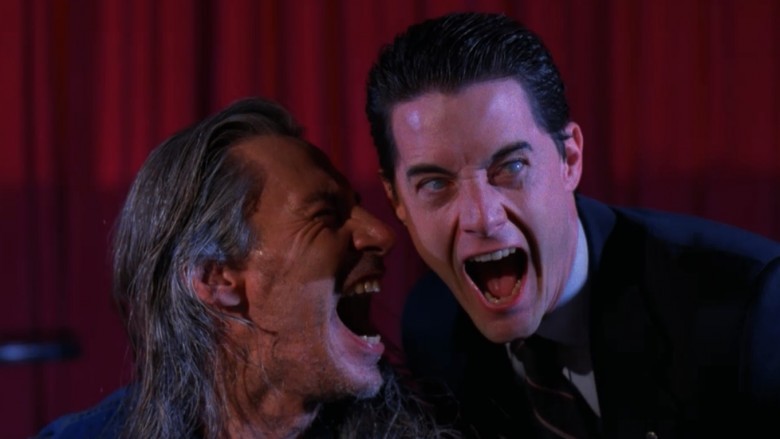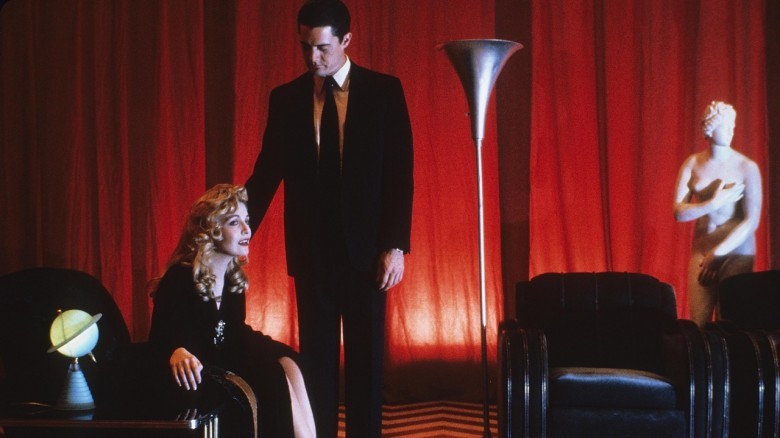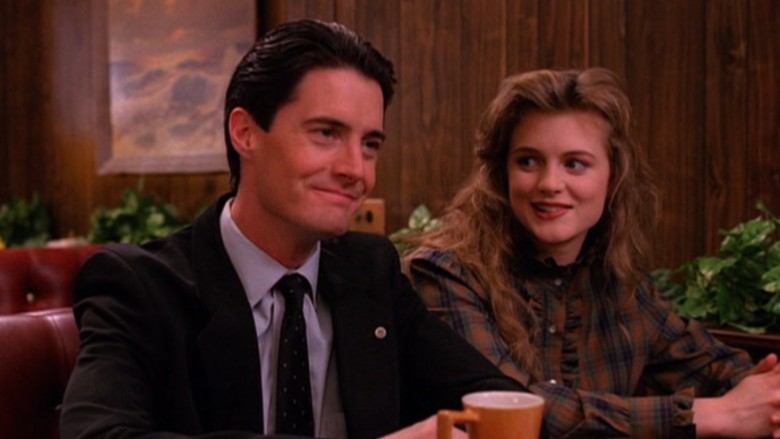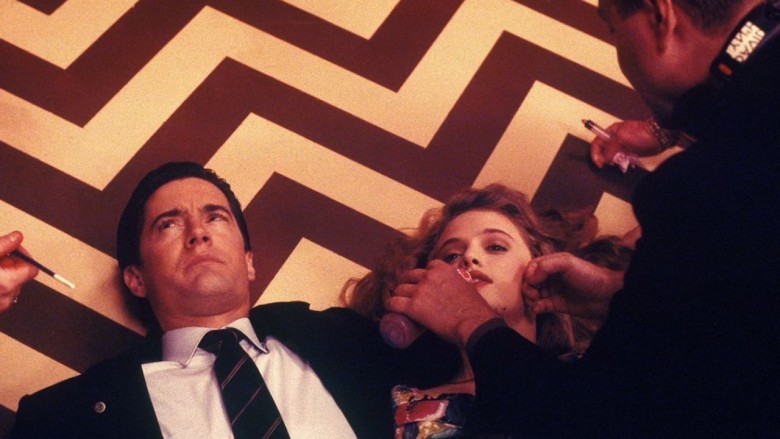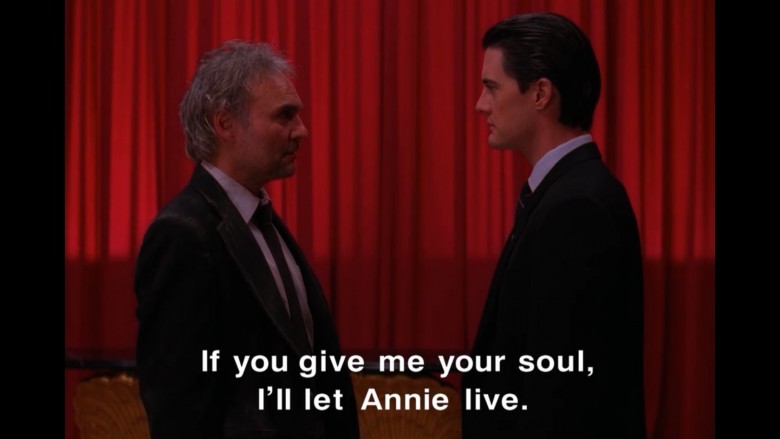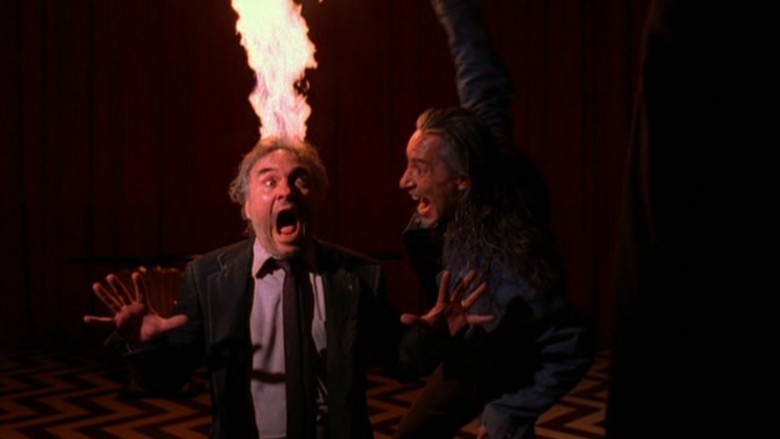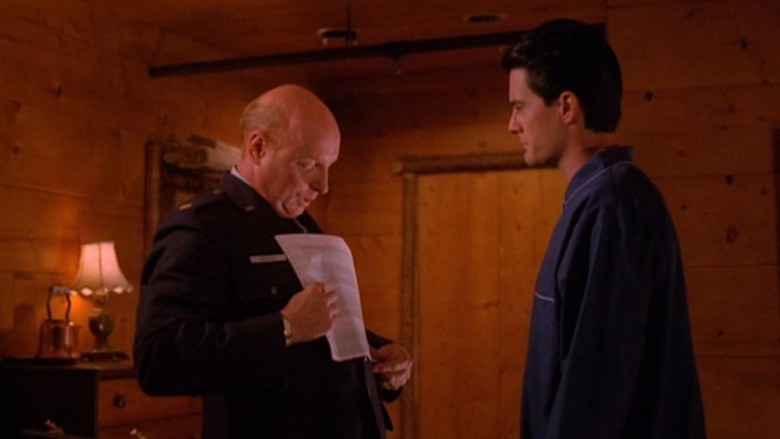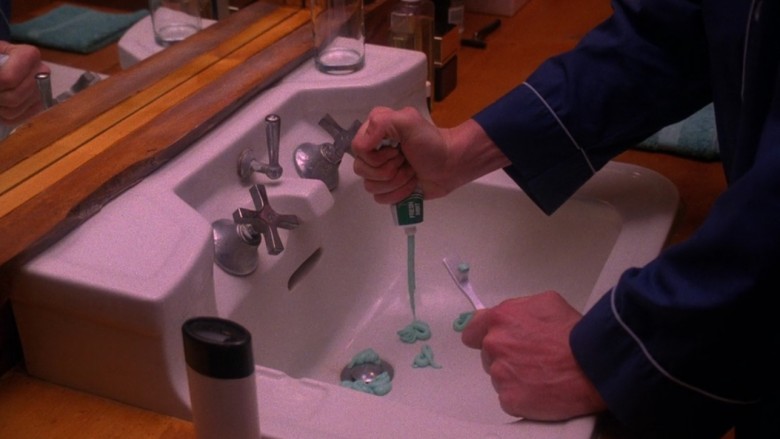The Ending Of Twin Peaks Explained
The super secret Showtime reboot of Twin Peaks finally has a premiere date: May 21. Fans of the kooky '90s series are approaching the new Twin Peaks, the brainchild of original creators David Lynch and Mark Frost (whew) with excitement and trepidation. Do we remember Twin Peaks well enough? And what was with that depressing Season 2 ending? Here are a few theories to jog your memory.
Laura's spirit was finally released into heaven
When we last saw Coop, he had ventured into The Black Lodge with his girlfriend Annie (Heather Graham) to see if he could finally solve the riddle of Windom Earle and his relation (if any) to Bob. While there, he meets a series of doppelgangers, including a white-walker-esque Leland Palmer, the Giant, the Man From Another Place, and Laura herself. Some have theorized that this Laura is actually a doppelganger, meant to confuse and entrap Cooper, not the spirit of Laura Palmer herself. Die-hard fans will remember that at the end of Fire Walk with Me, the Twin Peaks prequel, Laura was seen entering The White Lodge, the series' manifestation of heaven.
It'd be hard to say what this bodes for the reboot. Although Sheryl Lee, the actress who originally played Laura, has confirmed her return to the series, we can only guess what form Laura Palmer will appear in. She could show up in a series of flashbacks, as a doppelganger, or watching Coop from the White Lodge.
Annie is a figment of Coop's imagination
Annie's sudden appearance in the world of Twin Peaks and perhaps her early demise had fans wondering at the close of Season 2 if Annie ever existed at all. Annie willingly follows Coop "to the end of the world" to The Black Lodge, and her appearance in his life jogs some not-so-happy memories about Windom Earle, Coop's former partner, and his wife, Caroline, the love of Coop's life. Could Annie simply be a doppelganger sent by Bob to throw Coop off his trail and lead him to capture in the Season 2 finale? It's not a bad theory—especially considering that Heather Graham has confirmed she isn't returning to the new Twin Peaks as Annie.
Coop killed Annie in The Black Lodge (as Bob)
One major reason for Heather Graham's absence in the reboot, and the answer to Coop's terrifying question at the end of the second season finale ("How's Annie?") is that either Coop's doppelganger or Coop himself (perhaps possessed by Bob) is the one who killed Annie. Sheriff Truman discovers Coop and an injured Annie in the woods, and she's taken to the hospital. Coop is left to recover in his room at The Great Northern, and Annie's status, whether she lived or died, is never revealed. If Coop was indeed the person who killed Annie, what does this mean for him in the reboot? Will he be able to remember what happened in The Black Lodge?
Coop killed Windom Earle's wife, Caroline
This one's a whopper, but some people believe that Coop, not Windom Earle, actually killed Caroline, and that the entire Twin Peaks universe is a creation of Coop's in hopes of escaping his guilt. According to official Twin Peaks mythology, Caroline was married to Windom Earle, Coop's partner at the FBI. When Caroline became the star witness to a federal crime, she was placed under Coop's protection, and he fell in love with her. The story goes that Earle found out about their affair, killed Caroline, and stabbed Coop. But what if Coop's guilt about Caroline's death is because he killed Caroline, either on purpose, or inadvertently when she was killed to cover up whatever she knew about the crime? Some argue that Coop is on the run from his guilt in Twin Peaks and that the story of Laura Palmer and Bob is either a coincidence or a welcome distraction.
Windom Earle and Bob are the same thing
When the identity of Laura Palmer's killer was revealed in the beginning of the second season of Twin Peaks, fans wondered where the show would go after such a major plot point being put to rest. The character of Windom Earle was then introduced to give Coop some backstory and to expand the tension between Coop and an evil entity—but what if Windom Earle and Bob are the same thing? Some fans argue that Windom Earle may have been possessed by Bob when he "went mad" and murdered Caroline. And when Coop was trying to escape Windom Earle by going to Twin Peaks, he was actually still on the trail of the man who had murdered the only woman he ever loved: Bob.
The Black Lodge paved the way for sequels
In The Black Lodge, Laura Palmer (or her doppelganger) tells Coop, "I'll see you again in 25 years." Fire Walk with Me, the prequel (but last installment) of the Twin Peaks universe premiered in 1992, exactly 25 years ago. Fans have wondered over this statement since then, and now they have an answer, but others wonder if Lynch or Frost ever intended to bring Twin Peaks back from the dead. The Black Lodge sequence certainly raises a lot of unanswered questions about Coop's well-being, the meaning of Bob, and the afterlife of Laura Palmer enough for a reboot? We'll see.
It all has to do with Zen Buddhism
Both Agent Cooper and Windom Earle are obsessed with Zen Buddhism, and Coop frequently uses its teachings to help him solve smaller crimes on the way to discovering who killed Laura Palmer. In his essay "The Detective in Twin Peaks," Andreas Blassman explains what Coop calls his "Tibetan method."
"The Tibetan method demonstrates and summarizes what typifies both Cooper as a character and the show TP as a continuing series: The joy of detecting new approaches within a well-established genre; the refusal to accept one single possible explanation; the willingness to go a long way in order to reach a higher plane of knowledge; the acceptance of a 'Truth' that goes beyond the mere solution of a single case. Instead each question leads to a set of even bigger questions."
David Lynch is not a Buddhist, but he is a devoted practitioner of transcendental meditation and has even written a book on the subject. How this connects to the meaning of Twin Peaks is fascinating, especially when you apply it to Lynch's other movies and their swirling, concave narratives that are less about finding one answer than finding many.
Coop inadvertently discovered the secret to extraterrestrial life
One plot point from the second season of Twin Peaks that was never really resolved was the disappearance of Major Briggs. Shortly before vanishing, he makes mention of the existence of The White Lodge. We know that Major Briggs is somehow tied up in some top secret mission with the Air Force that may or may not have to do with the existence of UFOs or aliens. Some fans claim that this plot point is the secret to revealing the meaning of Twin Peaks, that Major Briggs realizes (albeit too late) that Coop has information that he needs in order to confirm the existence of extraterrestrial life. This theory is interesting considering Twin Peaks' enormous influence on another seminal '90s series, The X-Files.
Coop was taken over by Bob
This is the most widely accepted theory by Twin Peaks fans—that while in The Black Lodge, Coop was trapped by Windom Earle and Bob and sacrificed his soul for Annie's. Meaning that once out of The Black Lodge, Coop is no longer Coop, he's Bob. The horrifying ending, in which Coop smashes his face into the mirror and appears as Bob seems to indicate that as much is true, though this theory could certainly run side-by-side with a number of others we've mentioned. If it is true, it will be interesting to see where the reboot picks up, given that beloved Coop has become the bad guy.
It was all one big middle finger to the network
Both Mark Frost and David Lynch were busy with other projects while the second season of Twin Peaks was underway, and television critics have noted that it's unlikely that either of them thought the show would go past a first season. ABC put pressure on Frost and Lynch to solve Laura's murder at the end of the first season—a question that neither creator had intended to ever answer. They managed to put the big reveal in the second season, but after struggling with the network's demands, Frost and Lynch had become exhausted. Some fans theorize that the dark ending of the second season, which left so many questions, was Lynch and Frost's final middle finger to the network.
